serenity now
Anxiety Disorder
Quality Nutritional Supplementation Help Reduce the Severity and Frequency of Anxiety
by Ladd McNamara, M.D.

The article and protocol are for informational purposes only, and not intended as medical advice. Please read the Medical Disclaimer below, and consult with your personal physician before starting supplements and acting upon any information on this website.
Discussion
Anxiety, depression, bipolar depression, postpartum depression, and PTSD, are all related, and very complex, with various causes and effects. Psychological trauma, genetics, hormones, environment, and nutritional status all play a role in these disorders.
For PTSD, please see that article and protocol.
 A person with anxiety disorder or depression should be under the care of a properly-trained licensed physician and/or psychologist, as moderate to severe anxiety and depression should not to be taken lightly. The consequences of these disorders can be severe and life threatening.
A person with anxiety disorder or depression should be under the care of a properly-trained licensed physician and/or psychologist, as moderate to severe anxiety and depression should not to be taken lightly. The consequences of these disorders can be severe and life threatening.
We know the brain requires neurotransmitters to make connections between neurons (brain cells) for thinking, hormone regulation, and mood stabilization. The major mood-regulating hormones are serotonin, dopamine, and GABA, which are influenced by other hormones and one’s health status, as well as several other factors, including your thoughts. Your conscious and subconscious thoughts can actually change your mood, for better or for worse.
The production of the mood hormones (serotonin, dopamine, and GABA) are dependent upon micronutrients, such as calcium, magnesium, zinc, chromium, iron, folate, vitamin B6, vitamin B12, vitamin D, and omega-3 fatty acids. Micronutrient deficiencies are a known cause or factor of depression and/or anxiety.
Also, a depletion of the amino acid methionine and elevation of homocysteine are associated with both anxiety and depression and in turn, this situation is associated with genetic MTHFR mutations. I would highly recommend any person suffering from chronic depression or bipolar disorder to be tested for MTHFR mutations. Please read my article on this subject by clicking here.
Our Thoughts Are Our Reality

Even though we think that it is our mood that affects our thinking, it is actually the other way around. It is our thoughts that first affect our mood! Then our mood, for better or worse, feeds back onto our thinking, which further affects our mood, which can create habitual thinking patterns. For better or for worse, our thinking patterns and our mood, will then determine our behavior. Our habitual behavior (actions) create our lives. All of it begins with our thoughts. It is written, “as a man thinketh in his heart, so is he.” It is true, our continuous thought patterns literally create our reality.
Whether there is an MTHFR mutation or not, and whether a person is on prescribed medication, and/or taking nutritional supplements or not, cognitive therapy is often beneficial to improve both conscious and subconscious thought patterns. When thought patterns are improved, mood is often improved, and productive behaviors usually follow.
The majority of our mood, and anxiety/depressive disorders, are affected by thoughts, and to a lesser degree by hormones. For example, after delivering a baby, estrogen levels plummet. Women who experience PMS mood changes are more likely to experience postpartum depression and anxiety, because both situations are triggered by a relative decline circulating estrogen.
 A chronic lack of sleep results in a deficiency and desynchronization of many hormones in the brain and body, including the mood hormones. Hormone dysregulation results in such things as blood sugar destabilization, weight gain, as well as trouble with thinking and memory, and an increase in stress and anxiety. Prolonged lack of significant sleep can ultimately lead to severe depression and suicidal thoughts.
A chronic lack of sleep results in a deficiency and desynchronization of many hormones in the brain and body, including the mood hormones. Hormone dysregulation results in such things as blood sugar destabilization, weight gain, as well as trouble with thinking and memory, and an increase in stress and anxiety. Prolonged lack of significant sleep can ultimately lead to severe depression and suicidal thoughts.
Micronutrients Help Prevent Anxiety
The brain is mostly made of fat (lipids), and supplementing with at least 2000 mg of omega-3 fatty acids per day (such as fish oil), has been shown to help with anxiety and depression.(1) DHA, found in fish oil, has been shown to help with brain development and cognition. It makes sense that it helps with other functions of the brain, such as maintaining a healthy mood.
The B vitamins, particularly niacin, has been shown to help with bipolar disorders. Vitamin B12 is important for enzymatic conversion of folate/folic acid and homocysteine to methionine. In the liver, methionine is converted into cysteine, as well as S-adenosylmethionine (SAM-e), also known as, ademetionine. SAM-e is a methyl donor in methylation reactions, and is known to increase levels of the neurotransmitters dopamine, serotonin and norepinephrine. It can be taken as a supplement to treat anxiety and depression. It is relatively more expensive than the supplement 5-HTP, also used to treat anxiety and depression.
Vitamin B6 and 5-HTP
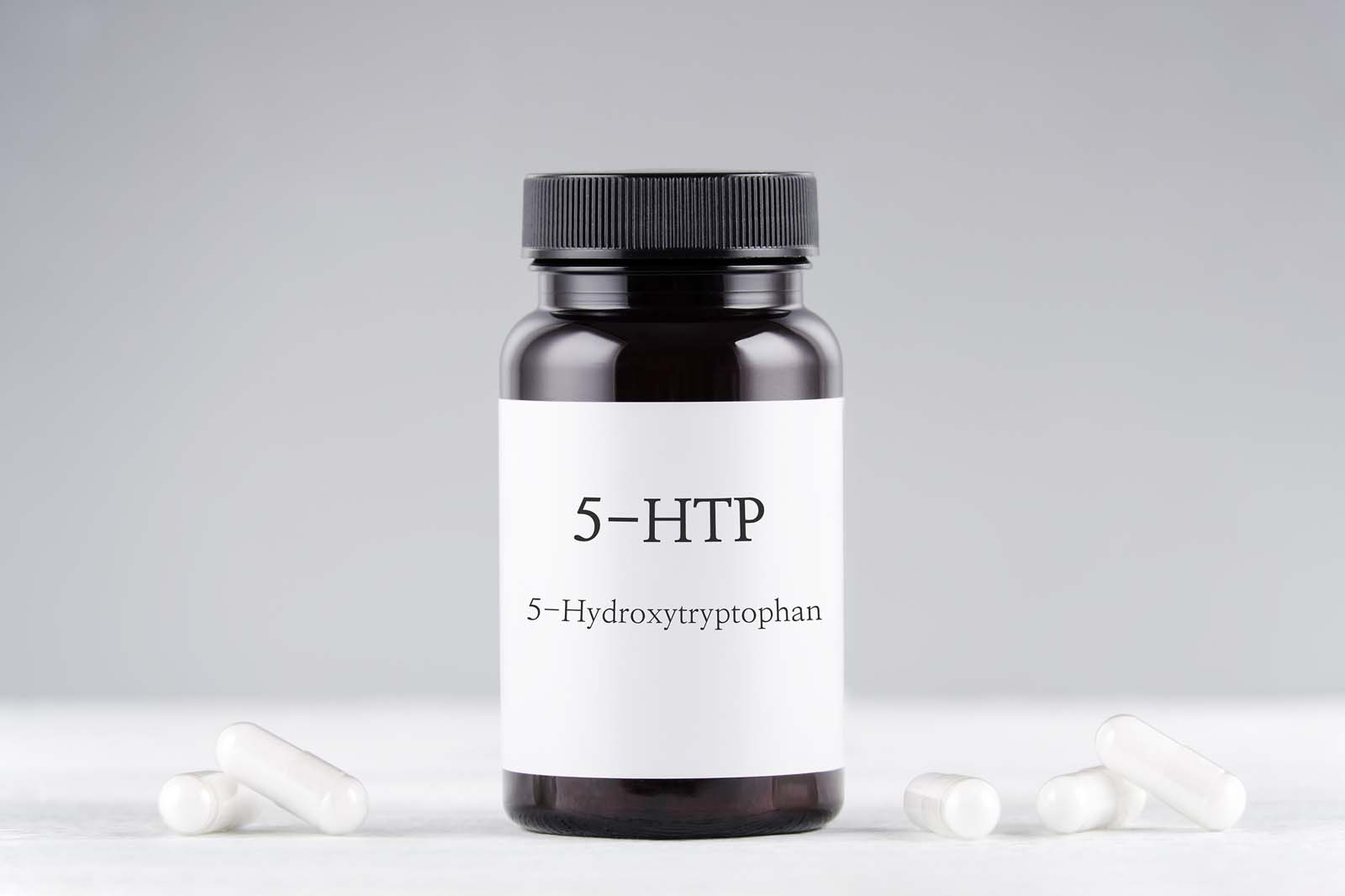 The amino acid 5-HTP (hydroxy-L-tryptophan) has been shown to be as effective as SSRI drugs (Prozac, etc.) in alleviating mild-to-moderate anxiety and depression. 5-HTP does not have the side effects of the SSRI drugs. 5-HTP naturally occurs in the brain. 5-HTP is considered generally safe, but caution should be taken if one is taking an SSRI, as there is a theoretical risk of triggering serotonin storm. (Although that can happen with taking SSRI drugs anyway, and not so much with 5-HTP.)
The amino acid 5-HTP (hydroxy-L-tryptophan) has been shown to be as effective as SSRI drugs (Prozac, etc.) in alleviating mild-to-moderate anxiety and depression. 5-HTP does not have the side effects of the SSRI drugs. 5-HTP naturally occurs in the brain. 5-HTP is considered generally safe, but caution should be taken if one is taking an SSRI, as there is a theoretical risk of triggering serotonin storm. (Although that can happen with taking SSRI drugs anyway, and not so much with 5-HTP.)
Your brain makes serotonin out of tryptophan, but there is an intermediary molecule, and that is 5-HTP. Vitamin B6 is needed for the brain to convert tryptophan into 5-hydroxy-L-tryptophan (5-HTP), and then again vitamin B6 is needed to convert 5-HTP into serotonin.
With a vitamin B6 deficiency, tryptophan will not be converted into 5-HTP, and 5-HTP will not be converted into serotonin. Even if you supplement with 5-HTP to boost up serotonin, with a vitamin B6 deficiency, the amount of serotonin being produced may be inadequate to maintain mood.
However, supplementing with mega-doses of vitamin B6 (> 300 mg) is not helpful, as too much vitamin B6 will act a B6 deficiency. When one supplements with vitamin B6 (pyridoxine), the body converts it into the bio-active form, pyridoxal 5’-phosphate (P5P). This is the bio-active form utilized by the enzymes in the liver, brain, and elsewhere in the body. When excessive amounts of vitamin B6 (pyridoxine) is available in the body, the conversion to pyridoxal 5’-phosphate (P5P) is shut down, and an effective vitamin B6 deficiency results. Symptoms of a B6 deficiency include anxiety and depression. Therefore, if one supplements with vitamin B6 greater than 100 mg, be sure to supplement with pyridoxal 5’-phosphate (P5P).
A good quality vitamin supplement will provide 32 mg per day of vitamin B6 (pyridoxine), which is enough for most people. This amount easily converts into the bio-active form. If one were to take additional vitamin B6, especially with 5-HTP (as in the protocol below), I suggest taking it in the pyridoxal 5’-phosphate (P5P) form. The 5-HTP product I recommend comes with B6 in the pyridoxal 5’-phosphate (P5P) form. This ensures that 5-HTP is more readily converted to serotonin. This should help with anxiety.
Probiotics
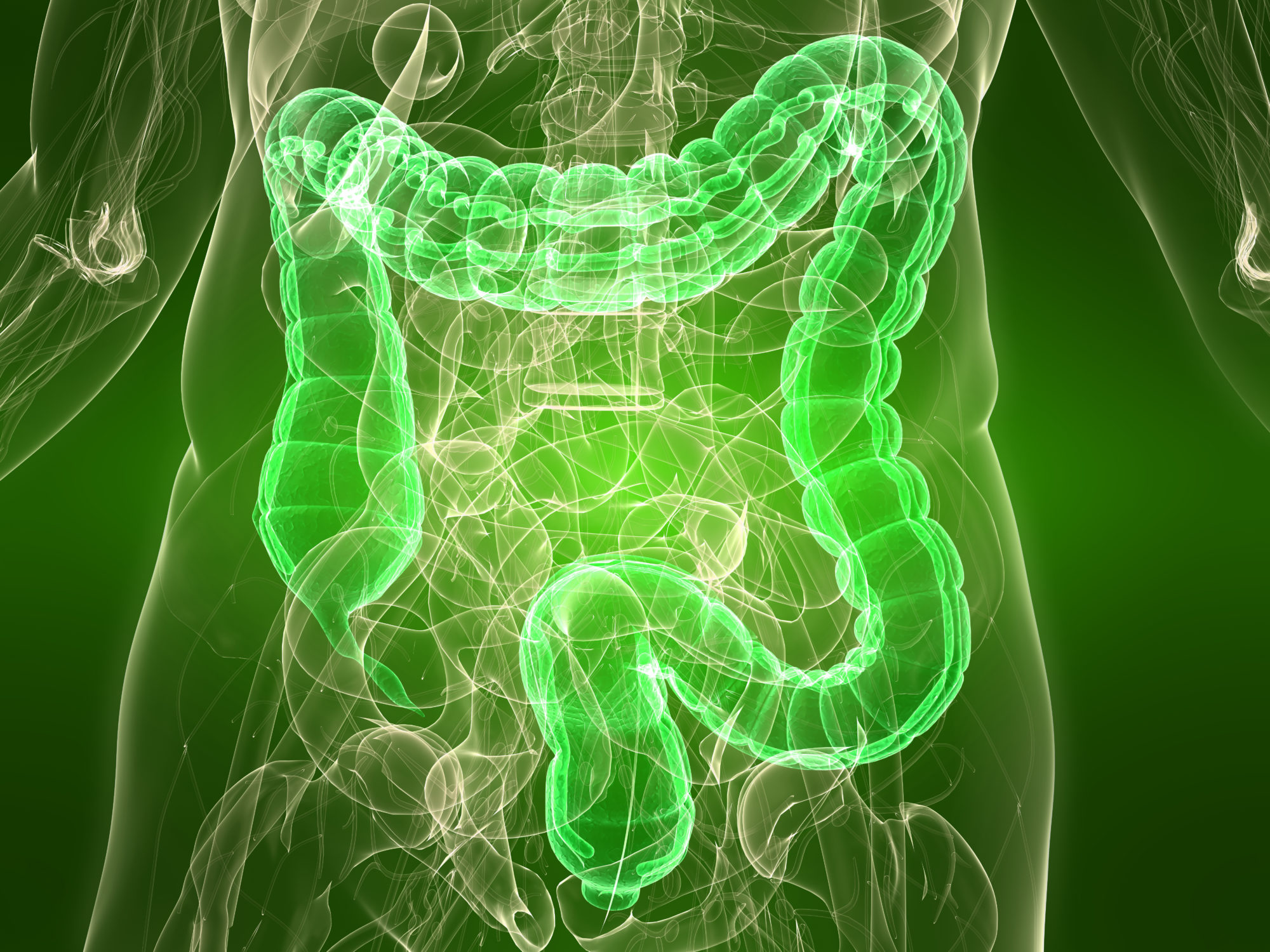 An unlikely factor for mood, anxiety, and depression is the health of the bowel. There is a gut-brain connection, and good bacteria (probiotics) in the bowel produce serotonin, dopamine, GABA, and other mood-enhancing biochemicals which affect mood.(2 – 4) In fact, much of the serotonin in our body is produced by the bacteria in our bowel! Without healthy bacteria, there is a decrease in serotonin production, which can make one susceptible to anxiety and depression. (5, 6)
An unlikely factor for mood, anxiety, and depression is the health of the bowel. There is a gut-brain connection, and good bacteria (probiotics) in the bowel produce serotonin, dopamine, GABA, and other mood-enhancing biochemicals which affect mood.(2 – 4) In fact, much of the serotonin in our body is produced by the bacteria in our bowel! Without healthy bacteria, there is a decrease in serotonin production, which can make one susceptible to anxiety and depression. (5, 6)
There have been several studies, such as one controlled study among college students evaluating anxiety levels. The study found that the students who took probiotics experienced a reduction in anxiety (and depression) compared to those students who did not take probiotics.(7)
Collectively, the bacteria in the bowel is called the microbiome, and it is often considered another organ of the body. With nearly 3 pounds of bacteria, numbering in the 50 – 100 trillion range, the diverse species of bacteria is considered the rain forest of the body. There is an intricate balance of friendly bacteria that we have a symbiotic relationship with in order to maintain digestion and a healthy mood. In addition, the bowel microbiome is a key component of the immune system.
Antibiotics, eating unhealthy foods, stress, lack of sleep, coffee, alcohol, lack of hormones, and a micronutrient deficiency, all can alter the balance of bacteria in the bowel. With a lack of healthy gut bacteria, less serotonin, dopamine, and GABA is produced, and one can be at risk for anxiety and/or depressive disorders, let alone infections, and digestive disorders.
In my protocol, I recommend a quality probiotic supplement with a combination of Lactobacillus rhamnosus LGG and Bifidobacterium BB-12, the two probiotic strains which scientific studies have shown to be important for establishing a foundation for the growth of numerous other healthy gut bacterial strains. By supplementing with these two strains of probiotics on a regular basis, one can maintain a healthy microbiome, which will produce healthy levels of serotonin, dopamine, and GABA, and help support a better mood without the risk of serotonin storm.
Numerous probiotic strains are available, many of which have very little-to-no clinical data regarding their benefit or physiological activity. The two strains mentioned above are backed by numerous human trials to prove viability and benefit in humans. They are designed for long shelf-life, and importantly, for withstanding the harsh acidic environment of the stomach so they can pass into the intestines intact, where they multiply and create a healthy environment for the microbiome to flourish.
Beta Glucans (Mushroom Extracts)
 Beta glucans, derived from the cell membranes of the reishi and shiitake mushrooms, and baker’s yeast extract, providing mood stabilizing benefits, especially for anxiety and depression, as well as mood. (8 – 14) In addition they provide immune support against infections and cancer.
Beta glucans, derived from the cell membranes of the reishi and shiitake mushrooms, and baker’s yeast extract, providing mood stabilizing benefits, especially for anxiety and depression, as well as mood. (8 – 14) In addition they provide immune support against infections and cancer.
Controlled studies have been done on women marathoners who took beta glucan (mushroom extracts), before and after marathons. (15) Researchers found that the women who took the beta glucan supplements had less colds and flus than the women who did not take the beta glucans, showing that the beta glucans supported the immune system, but also the women who took the beta glucans had less post-marathon depression and anxiety. Apparently, it is common to have mood disorders following a marathon, as the marathon taxes the body, including the production of mood hormones.
I had my own experience with beta glucans elevating my mood. I was on a flight from San Diego to Atlanta a few year ago. The person sitting next to me was extremely sick with a productive cold. Mucus was flying every where with each cough and sneeze, which was frequent. I was sure I was going to catch this guy’s cold.
As soon as I could after we took off, I got into my carry on luggage and took 2 tablets (in addition to the one I took that morning) of the beta glucan supplements, and then four hours later, I took two more beta glucan tablets. That night, I took two more tablets, and the following two days I took two beta glucan tablets three times per day. Not only did I not get sick, Three days later, I was feeling better than I had in years. I was wondering why I was feeling so good. I didn’t feel any stress, anxiety, or feelings of overwhelm. I kept telling people how good I felt.
It was about two weeks later when I read about the women marathoners and beta glucans, and did further research that I understood about the effects of beta glucans and mood. I now recommend beta glucan supplements for supporting the immune system, cancer prevention, and prevention of anxiety and depression.
Bacopa monnieri Extract
 Bacopa extract is a powerful antioxidant and safe anti-inflammatory micronutrient. It has been shown to improve memory, in those without memory deficits, as well as those with dementia. It has been shown to help attention, focus, cognition processing speed, improve spatial learning, and induce neuroplasticity, that is help the brain rewire damaged neuro connections.
Bacopa extract is a powerful antioxidant and safe anti-inflammatory micronutrient. It has been shown to improve memory, in those without memory deficits, as well as those with dementia. It has been shown to help attention, focus, cognition processing speed, improve spatial learning, and induce neuroplasticity, that is help the brain rewire damaged neuro connections.
Bacopa extract is used to help prevent neurogenerative disorders such as Alzheimer’s disease and Parkinson’s disease. It may also help prevent cancer, diabetes, and heart disease.
Bacopa extract helps reduce ADD/ADHD symptoms, OCD symptoms, as well as anxiety and stress. It helps your body adapt to stress, by becoming more resistant to stress. It helps reduce the feelings of being overwhelmed and anxiety by elevating the mood. One study found that taking 300 mg per day of Bacopa monnieri significantly reduced anxiety and depression compared to placebo. (16, 17)
There are several other micronutrients that help alleviate depression and anxiety. Those are listed in the Protocol below, and I recommend that people consider the supplements, and discuss these with their doctor to see if these are right for them.
Saffron Extract
 In Ancient Greece, saffron was used to boost libido, reduce anxiety, improve mood, and enhance memory. Saffron is rich in plant compounds that act as antioxidants, such as crocin, crocetin, safranal, and kaempferol. These compounds have even been found to induce apoptosis of cancer cells. Studies haves found that taking 30 mg of saffron daily was just as effective as fluoxetine (Prozac), imipramine (Tofranil), and citalopram (Celexa) in alleviating mild-to-moderate depression.
In Ancient Greece, saffron was used to boost libido, reduce anxiety, improve mood, and enhance memory. Saffron is rich in plant compounds that act as antioxidants, such as crocin, crocetin, safranal, and kaempferol. These compounds have even been found to induce apoptosis of cancer cells. Studies haves found that taking 30 mg of saffron daily was just as effective as fluoxetine (Prozac), imipramine (Tofranil), and citalopram (Celexa) in alleviating mild-to-moderate depression.
Studies found that the Greeks weren’t wrong; taking 30 mg of saffron daily was shown to enhance libido in both men and women, including improving erectile dysfunction in men taking medications with a side-effect of erectile dysfunction.
In addition to alleviating anxiety, saffron has been found to help reduce appetite and assist with weight loss.
Lemon Balm Extract
Lemon Balm Extract is a lemon-scented herb belonging to the mint family. It has been found to relieve symptoms of stress, help with relaxation in those with anxiety, and boost mood in those with mild-to-moderate depression.
A 2014 double-blind, placebo controlled cross-over study showed Lemon Balm to improve cognitive function. Participants who took Lemon Balm performed better in cognitive tasks involving memory, mathematics, and concentration, than those who took a placebo. This study also showed that Lemon Balm Extract helped to with alleviate insomnia.
It is best to take lemon balm extract with food, to not only reduce gastro-intestinal side effects, but to increase absorption.
Ashwagandha Extract
 Ashwagandha (Withania somnifera) an Ayurvedic herb, combats and reduces stress and anxiety, while it alleviates mild-to-moderate depression, elevating mood, which helps improve one’s general sense of well-being.
Ashwagandha (Withania somnifera) an Ayurvedic herb, combats and reduces stress and anxiety, while it alleviates mild-to-moderate depression, elevating mood, which helps improve one’s general sense of well-being.
Studies have shown that ashwagandha helps improve memory, task performance, and mental focus. When a person is feeling anxiety or depression, attention and focus suffers. This micronutrient, especially when combined with saffron extract and lemon balm extract, helps improve focus, attention, and performance, while elevating mood.
Ashwagnadha can assist with weight loss, as it helps to boost free testosterone in men. In both men and women, ashwagandha helps to reduce blood sugar levels (as well as cortisol), which also aids in weight loss and reduction of body fat. With the boost in testosterone, this herb has been found to improve semen and sperm quantity and quality, as well as muscle mass.
In both men and women, ashwagandha helps improve libido, and in women helps with sexual satisfaction, particularly helping to resolve anorgasmia caused by antidepressant medications.
Melatonin
 Melatonin helps support production and function of both serotonin, dopamine, and growth hormone, especially during sleep. Melatonin also supports a healthy immune system, by decreasing the risk for cancer and infections. In addition, melatonin helps with clear thinking and improved mood.
Melatonin helps support production and function of both serotonin, dopamine, and growth hormone, especially during sleep. Melatonin also supports a healthy immune system, by decreasing the risk for cancer and infections. In addition, melatonin helps with clear thinking and improved mood.
Melatonin has been studied among patients prior to undergoing surgery, and was found to reduce anxiety just as well as anti-anxiety medications. It has also been found to help reduce generalized anxiety among many people. I have not found it helpful to be used alone, but only as an adjunct to the other supplements in the protocol (below). It is part of a system to improve the way the body and mind should work.
Relora Plex
There are several other nutrients that help alleviate anxiety. Research has shown that a blend of extracts of Magnolia officinalis and Phellodendron amurense, found in a brand product called Relora, helps reduce anxiety and stress.(18, 19) I often recommend the use of this product for those suffering with anxiety, stress, and/or depression, along with 5-HTP, and the other micronutrients in the protocol below. I find that it takes more than one supplement to make the difference, but a good balance of many micronutrients, along with a healthy diet, quality sleep, and moderate exercise, to make the difference that people desire.
Supplement Protocol for Anxiety and Depression
 The protocols should not be seen as a cure. They cannot be called a treatment either; but they can offer brain and mood support, in conjunction with proper diet, adequate sleep, and avoidance of toxic substances. Please discuss these things with your doctor to see if they are right for you.
The protocols should not be seen as a cure. They cannot be called a treatment either; but they can offer brain and mood support, in conjunction with proper diet, adequate sleep, and avoidance of toxic substances. Please discuss these things with your doctor to see if they are right for you.
The article and protocol are for informational purposes only, and not intended as medical advice. Please read the Medical Disclaimer below, and consult with your personal physician before starting supplements and acting upon any information on this website.
Minimal Protocol for Mild-to-Moderate Anxiety and Depression

Basic Protocol for Mild-to-Moderate Anxiety and Depression
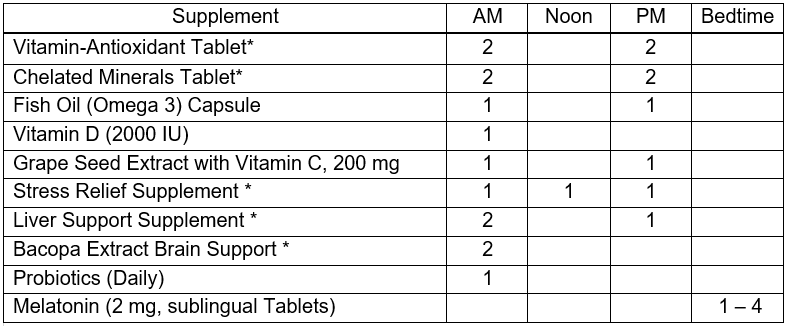
Average Protocol for Mild-to-Moderate Anxiety and Depression
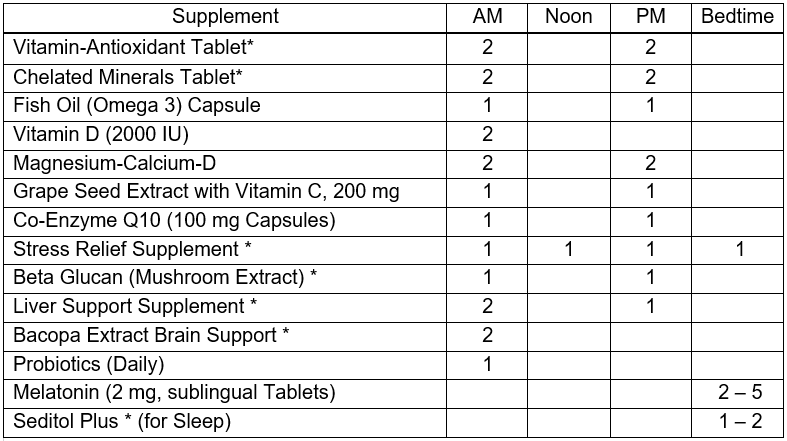
Advanced Protocol for Mild-to-Moderate Anxiety and Depression
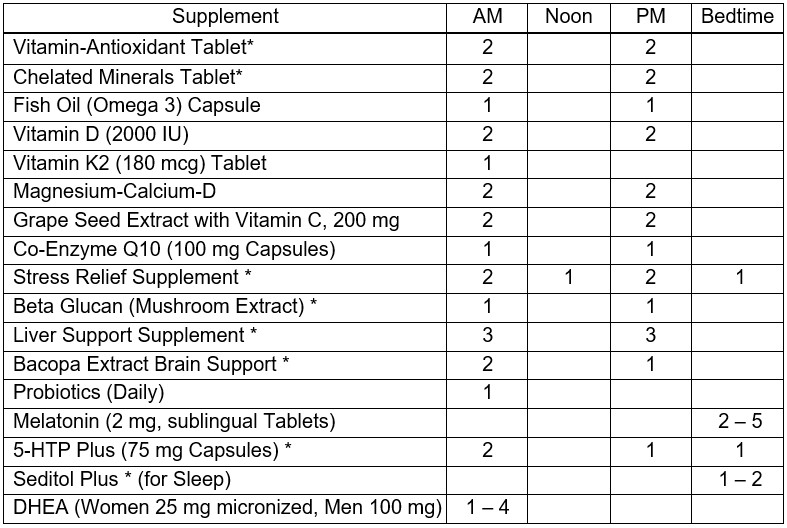
* Within the United States, there are a couple of specific products listed, such as 5-HTP Plus, Relora Plex, Seditol Plus, and DHEA that you can buy from Douglas Labs by first creating a customer account by CLICKING HERE. (If this link does not work for you, simply type “douglaslabs.com/patient-account” into a new browser tab.) And, please use Referral Code 2074214. Then, simply search for the products by name. Be sure to purchase the 5-HTP Plus, not just the 5-HTP, as you want the P5P that is provided in the “plus” formula. See the article above, which explains this.
- AM: With, or after breakfast
- Noon: At lunchtime with food, or shortly thereafter
- PM: Late afternoon with food, or at, or after dinner
- Please see my list of ingredients (below) that I like to see provided by a foundational vitamin and mineral supplement, as well as what is in the liver health supplement I use.
- Stress Relief Supplement; a quality supplement providing Saffron Extract, Lemon Balm Extract, and Ashwagandha Extract.
- Bacopa extract, combined with coffee cherry fruit extract, and American ginseng.
- Beta-glucans derived from Shiitake and Reishi mushrooms and baker’s yeast extract provide numerous benefits beyond supporting brain health and immune support. (Those with autoimmune diseases should not use the beta glucan supplement.)
- Probiotics, at least take 12 billion colony-forming bacteria, providing Lactobacillus rhamnosus LGG® and Bifidobacterium BB12®, every other day or daily.
- Liver Support Supplement is needed to support the liver to carry out its several functions, including production of many hormones, and biochemical processes (methylation), which ultimately can affect mood. A liver support product will provide ingredients such as milk thistle extract, N-acetyl-L-cysteine, alpha lipoic acid, olive extract, broccoli extract, green tea extract, curcurmin (turmeric extract), and biotin.
Ingredients that I like to see provided collectively by vitamin-antioxidant & chelated mineral tablets
Vitamin A, mostly as Beta Carotene
Vitamin C
Vitamin D3
Vitamin E
Vitamin K (K1 & K2)
B-Complex Vitamins
Curcumin (turmeric extract)
Quercetin
Green Tea Extract
Olive Extract
Rutin
Resveratrol
Choline
Lutein
Lycopene
N-Acetyl-L-Cysteine (NAC)
Calcium
Magnesium
Iodine (as potassium iodide)
Zinc
Selenium
Copper
Manganese
Chromium
Molybdenum
Including Ultra Trace Minerals
Medical Disclaimer
Information on this website, written, spoken, or in any other communication by Dr. Ladd McNamara or any other information or reference is for informational purposes only. The information provided on this website is a result of years of practice, experience, and study by the author. This information is not intended as a substitute for the advice provided by someone’s personal licensed physician or other healthcare professional, or any information contained on or in any product label or packaging. Do not use the information on this website, or any other form of communication from Dr. Ladd McNamara or the Dr. Ladd VIP Program, for diagnosing or treatment of a health issue or disease, or for the prescribing of medication or the use of supplementation without a discussion with your licensed health professional first. At best, the information provided on this website is only meant to supplement information provided by your own doctor or health professional, not to replace medical advice. The information from this website is not meant to cover all possible uses, precautions, interactions or possible adverse effects of nutritional supplements with or without medications, or in conjunction with specific medical conditions. The information from this website may not fit your specific health circumstances. Never delay seeking medical care or disregard advice from your health care professional because of information you have received directly or indirectly from this website, from the Dr. Ladd VIP Program, or from Dr. Ladd McNamara himself. Always speak with your physician or other healthcare professional before making any changes to your medication or embarking on a nutritional, herbal or homeopathic supplement program, or before using any treatment for a health concern. If you have, or suspect that you have, a medical problem, contact your health care provider promptly. Do not disregard professional medical advice or delay in seeking professional advice because of something you have read or heard on this website, or due to any other information from Dr. Ladd McNamara or his representatives. Information provided on this website or the V.I.P. Program, and the use of any products or services mentioned on this website (or as a result of information provided this program, article, or website) by you DOES NOT create a doctor-patient relationship between you and Ladd McNamara, M.D. Information and statements regarding dietary supplements have not been evaluated by the Food and Drug Administration and are not intended to diagnose, treat, cure, or prevent any disease.
References
- Su KP, et al. Association of Use of Omega-3 Polyunsaturated Fatty Acids With Changes in Severity of Anxiety Symptoms: A Systematic Review and Meta-analysis. JAMA Netw Open. 2018 Sep 7;1(5):e182327.Calabrese C, et al.
- Wall R, et al. Bacterial neuroactive compounds produced by psychobiotics. Adv Exp Med Biol. 2014;817:221-39.
- Tian P, et al. Towards a psychobiotic therapy for depression: Bifidobacterium breve CCFM1025 reverses chronic stress-induced depressive symptoms and gut microbial abnormalities in mice. Neurobiol Stress. 2020 Mar 20;12:100216.
- Xie R, et al. Oral treatment with Lactobacillus reuteri attenuates depressive-like behaviors and serotonin metabolism alterations induced by chronic social defeat stress. J Psychiatr Res. 2020 Mar;122:70-78.
- Wallace CJK, Milev R. The effects of probiotics on depressive symptoms in humans: a systematic review. Ann Gen Psychiatry. 2017 Feb 20;16:14.
- Alok A, et al. Probiotics: A New Era of Biotherapy. Adv Biomed Res. 2017 Mar 7;6:31.
- Pinto-Sanchez MI, et al. Probiotic Bifidobacterium longum NCC3001 Reduces Depression Scores and Alters Brain Activity: A Pilot Study in Patients With Irritable Bowel Syndrome. Gastroenterology. 2017 Aug;153(2):448-459.e8.
- Bashir KMI, et al. Clinical and Physiological Perspectives of β-Glucans: The Past, Present, and Future. Int J Mol Sci. 2017 Sep;18(9):1906.
- Yuan H, et al. Effect of the Modifications on the Physicochemical and Biological Properties of β-Glucan—A Critical Review. Molecules. 2020 Jan;25(1):57.
- Geller A, et al. Yeast-Derived β-Glucan in Cancer: Novel Uses of a Traditional Therapeutic. Int J Mol Sci. 2019 Aug; 20(15):3618.
- Zhang M, et al. Optimizing Tumor Microenvironment for Cancer Immunotherapy: β-Glucan-Based Nanoparticles. Front Immunol. 2018;9:41.
- Shah VB, et al. Beta glucan attenuates TLR2- and TLR4-mediated cytokine production by microglia. Neurosci Left. 2009 Jul 24; 458(3): 111-115.
- Rahar S, et al. Preparation, characterization, and biological properties of beta glucans. J Adv Pharm Technol Res. 2011 Apr-Jun; 2(2): 94-103.
- Nelson ED, et al. Neurologic effects of exogenous saccharides: A review of controlled human, animal, and in vitro studies. Nutr Neurosci. 2012 Jul;15(4):149–162.
- Talbott S, Talbott J. Effect of BETA 1, 3/1, 6 GLUCAN on Upper Respiratory Tract Infection Symptoms and Mood State in Marathon Athletes. J Sports Sci Med. 2009 Dec 1;8(4):509-15.
- Calabrese C, et al. Effects of a standardized Bacopa monnieri extract on cognitive performance, anxiety, and depression in the elderly: a randomized, double-blind, placebo-controlled trial. J Altern Complement Med. 2008 Jul;14(6):707-13.
- Stough C, et al. The chronic effects of an extract of Bacopa monniera (Brahmi) on cognitive function in healthy human subjects. Psychopharmacology (Berl). 2001 Aug;156(4):481-4.
- Talbott SM, et al. Effect of Magnolia officinalis and Phellodendron amurense (Relora®) on cortisol and psychological mood state in moderately stressed subjects. J Int Soc Sports Nutr. 2013 Aug 7;10(1):37.
- Kalman DS, et al. Effect of a proprietary Magnolia and Phellodendron extract on stress levels in healthy women: a pilot, double-blind, placebo-controlled clinical trial. Nutr J. 2008 Apr 21;7:11. doi: 10.1186/1475-2891-7-11.
- Khazdair MR, et al. The effects of Crocus sativus (saffron) and its constituents on nervous system: A review. Avicenna J Phytomed. Sep-Oct 2015;5(5):376-91.
- Rezaee R, Hosseinzadeh H. Safranal: from an aromatic natural product to a rewarding pharmacological agent. Iran J Basic Med Sci. 2013 Jan;16(1):12-26.
- Hausenblas HA, et al. Saffron (Crocus sativus L.) and major depressive disorder: a meta-analysis of randomized clinical trials. J Integr Med. 2013 Nov;11(6):377-83.
- Noorbala AA, et al. Hydro-alcoholic extract of Crocus sativus L. versus fluoxetine in the treatment of mild to moderate depression: a double-blind, randomized pilot trial. J Ethnopharmacol. 2005 Feb 28;97(2):281-4.
- Moshiri E, et al. Crocus sativus L. (petal) in the treatment of mild-to-moderate depression: a double-blind, randomized and placebo-controlled trial. Phytomedicine. 2006 Nov;13(9-10):607-11.
- Kashani L, et al. Comparison of Saffron versus Fluoxetine in Treatment of Mild to Moderate Postpartum Depression: A Double-Blind, Randomized Clinical Trial. Pharmacopsychiatry. 2017 Mar;50(2):64-68.
- Shafiee M, et al. Saffron in the treatment of depression, anxiety and other mental disorders: Current evidence and potential mechanisms of action. J Affect Disord. 2018 Feb;227:330-337.
- Aung HH, et al. Crocin from Crocus sativus possesses significant anti-proliferation effects on human colorectal cancer cells. Exp Oncol. 2007 Sep;29(3):175-80.
- Samarghandian S, Borji A. Anticarcinogenic effect of saffron (Crocus sativus L.) and its ingredients. Pharmacognosy Res. 2014 Apr;6(2):99-107.
- Abedimanesh N, et al. Saffron and crocin improved appetite, dietary intakes and body composition in patients with coronary artery disease. J Cardiovasc Thorac Res. 2017;9(4):200-208.
- Chen AY, Chen YC. A review of the dietary flavonoid, kaempferol on human health and cancer chemoprevention. Food Chem. 2013 Jun 15;138(4):2099-107.
- Modabbernia A, et al. Effect of saffron on fluoxetine-induced sexual impairment in men: randomized double-blind placebo-controlled trial. Psychopharmacology (Berl). 2012 Oct;223(4):381-8.
- Maleki-Saghooni N, et al. A systematic review and meta-analysis of clinical trials on saffron ( Crocus sativus) effectiveness and safety on erectile dysfunction and semen parameters. Avicenna J Phytomed. May-Jun 2018;8(3):198-209.
- Kashani L, et al. Saffron for treatment of fluoxetine-induced sexual dysfunction in women: randomized double-blind placebo-controlled study. Hum Psychopharmacol. 2013 Jan;28(1):54-60.
- Gout B, et al. Satiereal, a Crocus sativus L extract, reduces snacking and increases satiety in a randomized placebo-controlled study of mildly overweight, healthy women. Nutr Res. 2010 May;30(5):305-13.
- Abedimanesh N, et al. Saffron and crocin improved appetite, dietary intakes and body composition in patients with coronary artery disease. J Cardiovasc Thorac Res. 2017;9(4):200-208.
- Kang C, et al. Saffron (Crocus sativus L.) increases glucose uptake and insulin sensitivity in muscle cells via multipathway mechanisms. Food Chem. 2012 Dec 15;135(4):2350-8.
Scholey A, et al. - Anti-Stress Effects of Lemon Balm-Containing Foods. Nutrients 2014, 6(11), 4805-4821.
- Kenney DO, et al. Attenuation of laboratory-induced stress in humans after acute administration of Melissa officinalis (Lemon Balm). Psychosom Med. Jul-Aug 2004;66(4):607-13.
- Müllera SF, Klement S. A combination of valerian and lemon balm is effective in the treatment of restlessness and dyssomnia in children. Phytomed 2006, 13(6), 383-387.
- Candelario M, et al. Direct evidence for GABAergic activity of Withania somnifera on mammalian ionotropic GABAA and GABAρ receptors. J Ethnopharmacol. 2015 Aug 2;171:264-72.
- Chandrasekhar K, et al. A prospective, randomized double-blind, placebo-controlled study of safety and efficacy of a high-concentration full-spectrum extract of ashwagandha root in reducing stress and anxiety in adults. Indian J Psychol Med. 2012 Jul;34(3):255-62.
Cooley K, et al. - Naturopathic care for anxiety: a randomized controlled trial ISRCTN78958974. PLoS One. 2009 Aug 31;4(8):e6628.
- Choudhary D, et al. Efficacy and Safety of Ashwagandha (Withania somnifera (L.) Dunal) Root Extract in Improving Memory and Cognitive Functions. J Diet Suppl. 2017 Nov 2;14(6):599-612.
- Pingali U, et al. Effect of standardized aqueous extract of Withania somnifera on tests of cognitive and psychomotor performance in healthy human participants. Pharmacognosy Res. 2014 Jan;6(1):12-8.
- Manchanda S, et al. Aqueous Leaf Extract of Withania somnifera as a Potential Neuroprotective Agent in Sleep-deprived Rats: a Mechanistic Study. Mol Neurobiol. 2017 May;54(4):3050-3061.
- Baitharu I, et al. Withania somnifera root extract ameliorates hypobaric hypoxia induced memory impairment in rats. J Ethnopharmacol. 2013 Jan 30;145(2):431-41.
- Kurapati KRV, et al. Ashwagandha (Withania somnifera) reverses β-amyloid1-42 induced toxicity in human neuronal cells: implications in HIV-associated neurocognitive disorders (HAND). PLoS One. 2013 Oct 16;8(10):e77624.
- Soman S, et al. Oxidative stress induced NMDA receptor alteration leads to spatial memory deficits in temporal lobe epilepsy: ameliorative effects of Withania somnifera and Withanolide A. Neurochem Res. 2012 Sep;37(9):1915-27.
- Mirjalili MH, et al. Steroidal lactones from Withania somnifera, an ancient plant for novel medicine. Molecules. 2009 Jul 3;14(7):2373-93.
- Gorelick J, et al. Hypoglycemic activity of withanolides and elicitated Withania somnifera. Phytochemistry. 2015 Aug;116:283-289.
- Agnihotri AP, et al. Effects of Withania somnifera in patients of schizophrenia: A randomized, double blind, placebo controlled pilot trial study. Indian J Pharmacol. 2013 Jul-Aug; 45(4): 417–418.
- Andallu B, Radhika B. Hypoglycemic, diuretic and hypocholesterolemic effect of winter cherry (Withania somnifera, Dunal) root. Indian J Exp Biol. 2000 Jun;38(6):607-9.
- Vyas AR, Singh SV. Molecular targets and mechanisms of cancer prevention and treatment by withaferin a, a naturally occurring steroidal lactone. AAPS J. 2014 Jan;16(1):1-10.
- Nishikawa Y, et al. Withaferin A Induces Cell Death Selectively in Androgen-Independent Prostate Cancer Cells but Not in Normal Fibroblast Cells. PLoS One. 2015 Jul 31;10(7):e0134137.
- Kakar SS, et al. Withaferin a alone and in combination with cisplatin suppresses growth and metastasis of ovarian cancer by targeting putative cancer stem cells. PLoS One. 2014 Sep 29;9(9):e107596.
- Auddy B, et al. A Standardized Withania somnifera Extract Significantly Significantly Reduces Stress-Related Parameters in Chronically Stressed Humans: A Double-Blind, Plaebo-Controlled Study. JANA 2008 11(1):50-56.
- Mahdi AA, et al. Withania somnifera Improves Semen Quality in Stress-Related Male Fertility. Evid Based Complement Alternat Med. 2009 Sep 29;2011:576962.
- Ahmad MK, et al. Withania somnifera improves semen quality by regulating reproductive hormone levels and oxidative stress in seminal plasma of infertile males. Fertil Steril. 2010 Aug;94(3):989-96.
- Wankhede S, et al. Examining the effect of Withania somnifera supplementation on muscle strength and recovery: a randomized controlled trial. J Int Soc Sports Nutr. 2015 Nov 25;12:43.
- Sandhu JS, et al. Effects of Withania somnifera (Ashwagandha) and Terminalia arjuna (Arjuna) on physical performance and cardiorespiratory endurance in healthy young adults. Int J Ayurveda Res. 2010 Jul;1(3):144-9.
- Visavadiya NP, Narasimhacharya AVRL, Hypocholesteremic and antioxidant effects of Withania somnifera (Dunal) in hypercholesteremic rats. Phytomedicine. 2007 Feb;14(2-3):136-42.
All materials on this website, written, audio, visual, are copyrighted by Ladd McNamara, Inc., and are not to be distributed, duplicated, shared, posted to another website or social media sites (including Facebook, etc.), except for under the Terms of Use for sharing approved articles and videos.
As a VIP member, you agree that you will NOT share any written, audio, video, or any other proprietary materials from this website with those in your organization, other associates, or team members; and that you will only share approved articles/protocols and videos with your OWN PERSONAL & IMMEDIATE customers, clients, and prospective customers/clients. Doing so, would result in the loss of your Dr. Ladd VIP membership without a refund.
Thank you for your honesty and integrity.
About the Dr. Ladd VIP Program
There are many more articles on various subjects, as well as videos on health concerns, along with specific nutritional supplement protocols for managing health concerns and disease. Of course, this is all for informational purposes, and not to be taken as medical advice. (See medical disclaimer above.) Please learn more at www.drladdvip.com.
Please read about the benefits of being a Dr. Ladd VIP Member. It is a subscription-based personal program to better your health, energy, and passion for life, and for helping others. This program includes on-going support for yourself, and as you help customers and clients with your health enterprise.
Do you have a need to understand how NUTRITIONAL SUPPLEMENTS can benefit the health of people suffering from any number of chronic diseases; such as Heart Disease, Cancer, Diabetes, Arthritis, Dementia, Lyme Disease, Autoimmune Diseases, and Many More!
- Do you have a need for SUPPLEMENT PROTOCOLS as to what specific supplement combinations to use?
- How about WHY SUPPLEMENTS? How do you chose a QUALITY BRAND?
- Do you have a need to BETTER ASSIST CUSTOMERS in making a good decision?
- How about ON-GOING SUPPORT for ON-GOING QUESTIONS?
- How about YOUR PERSONAL HEALTH, and/or Your PERSONAL RELATIONSHIPS?
Happiness and Health includes not only being free of disease, but passionately engaged in a relationship, in life, and in helping others! It means living with less stress, more fun, and activity.
The Dr. Ladd VIP Program is about Vitality, Intimacy, and Passion, being balanced in all aspects of life, and helping others to get there too.
 Please read more at www.drladdvip.com, and take advantage of the Video Courses, the Supplement Protocols, Articles, Downloadable PDFs, and Dr. Ladd VIP Facebook Community and Support. “Have me in your back pocket” by becoming a VIP Member Today!
Please read more at www.drladdvip.com, and take advantage of the Video Courses, the Supplement Protocols, Articles, Downloadable PDFs, and Dr. Ladd VIP Facebook Community and Support. “Have me in your back pocket” by becoming a VIP Member Today!
If you are not a VIP member, please subscribe to my email list. If you are already a VIP member, no need to subscribe to the email newsletter list. Thank you.
dr. ladd
Please learn more about the Dr. Ladd VIP program here: www.drladdvip.com.
Please Subscribe to Dr. Ladd’s Email List
Receive health and website updates, as well as information on upcoming FREE health-related webinars.
All information, written or video, is copyrighted by Ladd McNamara, Inc., and is not to be shared, duplicated, or posted to other websites or social media platforms without express permission from Ladd McNamara, M.D. Thank you.
Dr. Ladd’s V.I.P. Program and Website is Owned and Operated by Ladd R. McNamara, M.D. and Ladd McNamara, Inc., a California corporation.
